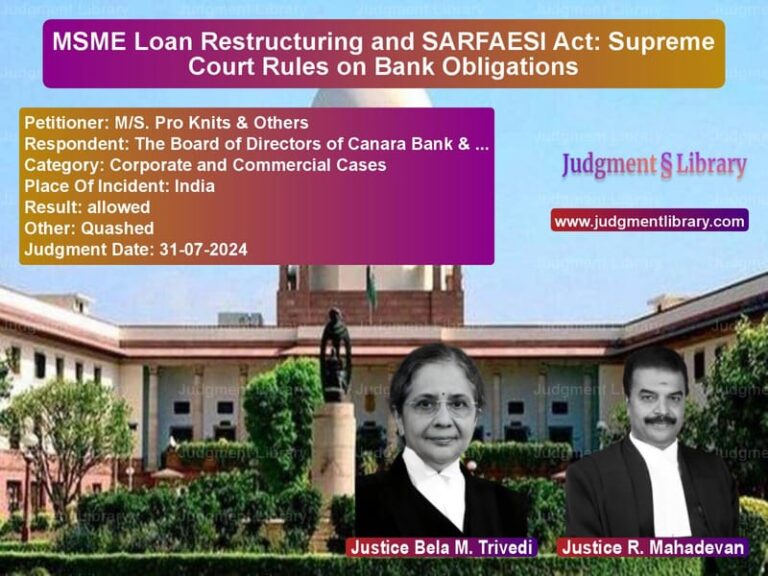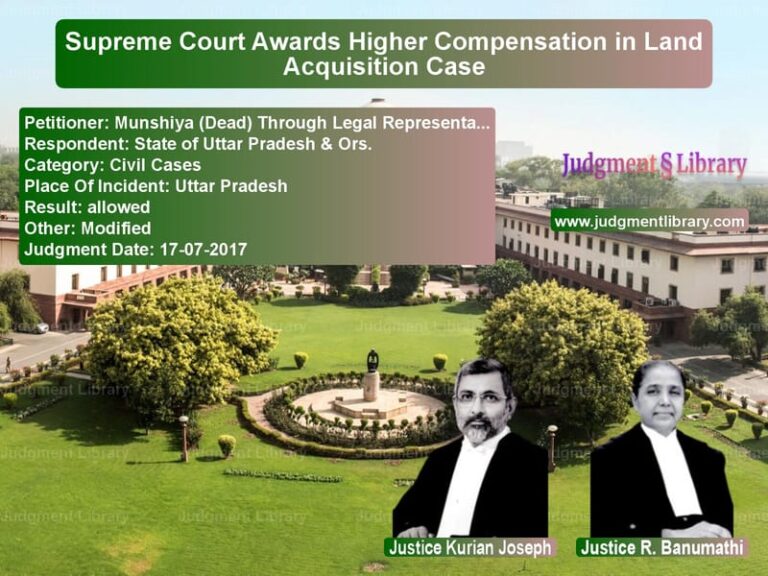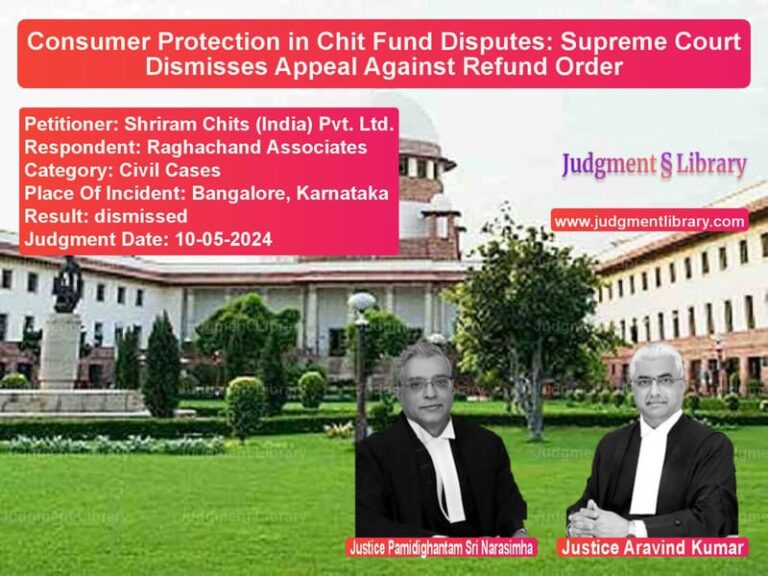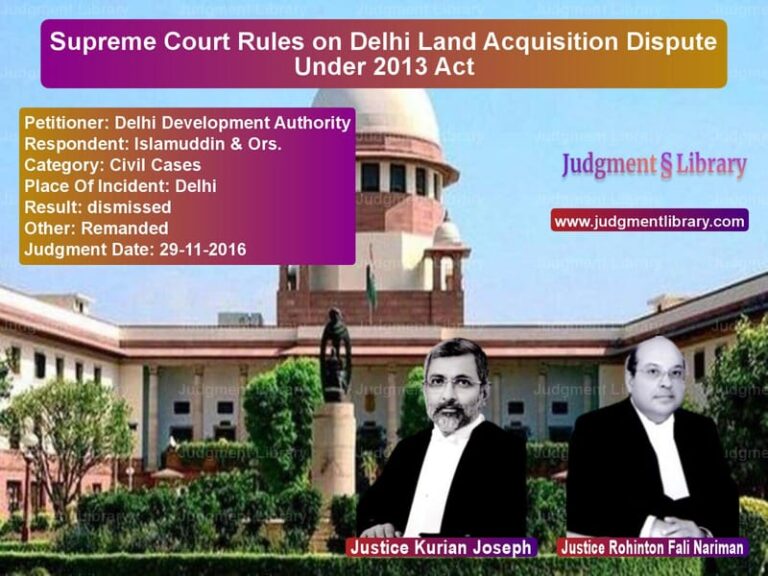Transfer of Divorce Case: Aarthi vs. R.M. Rajeshkumar
The case of Aarthi vs. R.M. Rajeshkumar pertains to the transfer of matrimonial proceedings between two courts in Tamil Nadu. The Supreme Court had to decide whether two related cases should be heard at the Family Court in Coimbatore or at the Subordinate Judge’s Court in Karur. The core issue revolved around the convenience of the parties, the jurisdiction of the courts, and the need for an efficient resolution of matrimonial disputes.
The Supreme Court ruled in favor of consolidating both cases and transferring them to the Family Court in Coimbatore, ensuring an expeditious trial. The decision aims at facilitating the efficient handling of matrimonial matters, preventing unnecessary delays, and ensuring that justice is administered promptly.
Background of the Case
The dispute involved two separate matrimonial cases:
- HMOP No. 63 of 2013 – Pending before the Subordinate Judge, Karur.
- HMOP No. 1050 of 2014 – Pending before the Family Court, Coimbatore.
The primary issue was whether these cases should be heard separately in two different courts or whether they should be consolidated for convenience and efficiency. The petitioner, Aarthi, sought the transfer of the case to the Family Court in Coimbatore to avoid conflicting judgments and expedite the resolution of the dispute.
Key Legal Issues
- Whether matrimonial cases filed by the same parties should be consolidated and heard in a single court.
- Whether Coimbatore or Karur was the appropriate jurisdiction for conducting the trial.
- Whether the transfer would serve the interest of justice and avoid unnecessary delays.
Arguments by the Parties
Appellant’s (Aarthi) Arguments
- The cases should be heard together to avoid conflicting judgments.
- Conducting parallel proceedings in two different courts would cause unnecessary delays and hardship.
- The Family Court in Coimbatore was better suited to handle both cases efficiently.
Respondent’s (R.M. Rajeshkumar) Arguments
- The jurisdiction of the Subordinate Judge, Karur, was appropriate for the case originally filed there.
- Transferring the case could inconvenience one of the parties.
- There was no compelling reason to consolidate the cases.
Supreme Court’s Judgment
The Supreme Court ruled in favor of transferring the case to the Family Court in Coimbatore, considering both the convenience of the parties and the interests of justice.
“The learned counsel on both sides have agreed that both the cases can be tried in Family Court at Coimbatore. Therefore, this appeal is disposed of by transferring HMOP No. 63 of 2014, pending in the Court of Subordinate Judge, Karur, Tamil Nadu to the Family Court at Coimbatore with a direction to the Family Court at Coimbatore to consolidate both the cases and dispose of the same expeditiously and preferably within six months from the date of first appearance of the parties pursuant to this order.”
Key Observations by the Court
- Both parties agreed to the transfer of the case.
- Consolidation would prevent inconsistent rulings and expedite the resolution of matrimonial disputes.
- The Family Court in Coimbatore was the appropriate forum for handling both matters.
- The court directed the Family Court to dispose of the cases within six months.
Final Judgment
The Supreme Court ruled:
- HMOP No. 63 of 2013 was transferred to the Family Court, Coimbatore.
- The Family Court was directed to consolidate both cases and dispose of them within six months.
- The parties were instructed to appear before the Family Court on August 2, 2016.
- The Registry was directed to transmit a copy of the order to both courts immediately.
- No costs were imposed on either party.
Conclusion and Legal Impact
This ruling reinforces several key legal principles:
- Consolidation of related cases prevents conflicting judgments and promotes judicial efficiency.
- Matrimonial disputes should be resolved expeditiously to minimize hardship for the parties involved.
- Consent of both parties can facilitate jurisdictional transfers to ensure a fair trial.
- Higher courts can intervene in procedural matters to ensure speedy justice.
The Supreme Court’s decision ensures that matrimonial disputes are handled efficiently and that judicial resources are used effectively to avoid unnecessary delays.
Judgment delivered by: Kurian Joseph, Rohinton Fali Nariman
Judgment Date: June 29, 2016
The ruling establishes an important precedent in matrimonial law, ensuring that related cases are handled in a manner that serves justice and efficiency.
Don’t miss out on the full details! Download the complete judgment in PDF format below and gain valuable insights instantly!
Download Judgment: Aarthi vs R.M. Rajeshkumar Supreme Court of India Judgment Dated 29-06-2016-1741872486426.pdf
Direct Downlaod Judgment: Direct downlaod this Judgment
See all petitions in Mutual Consent Divorce
See all petitions in Child Custody
See all petitions in Property Division in Divorce Cases
See all petitions in Judgment by Kurian Joseph
See all petitions in Judgment by Rohinton Fali Nariman
See all petitions in allowed
See all petitions in Transferred
See all petitions in supreme court of India judgments June 2016
See all petitions in 2016 judgments
See all posts in Divorce Cases Category
See all allowed petitions in Divorce Cases Category
See all Dismissed petitions in Divorce Cases Category
See all partially allowed petitions in Divorce Cases Category







